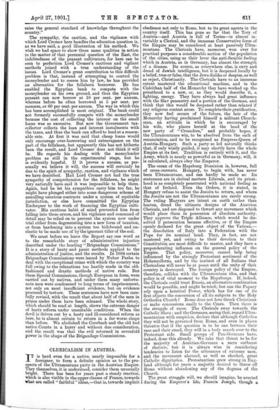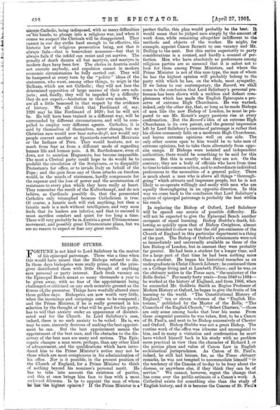CLERICALISM IN AUSTRIA.
IT is hard. even for a native, nearly impossible for a foreigner, to form a definite opinion as to the pro- spects of the Ultramontane party in the Austrian Empire. They themselves, it is understood, consider them unusually bright. There has been for years past a steady reaction, which is also visible in the upper classes of France, towards what are called " faithful " ideas,—that is, towards implicit obedience not only to Rome, but to its great agents in the country itself. This has gone so far that the Tory of Austria—and Austria is full of Tories—is almost in- variably a Clerical, and the immense Conservative force of the Empire may be considered at least passively Ultra- montane. The Clericals have, moreover, won over for practical purposes a considerable section of the population of the cities, using as their lever the anti-Semitic feeling which in Austria, as in Germany, has almost the strength of a disease. Its source, as everywhere else, is envy and dread of Jewish intelligence, but it is deepened locally by a belief, true or false, that the Jews dislike or despise, as well as reject, Christianity. The Clericals have to an immense extent mastered the educational machine, and in the Cisleithan half of the Monarchy they have worked up the priesthood to a new, or, as they would describe it, a fighting, energy. They have always had great influence with the Slav peasantry and a portion of the German, and think that this would be deepened rather than relaxed if any religious contest arose. To complete their gratification, they now feel secure of the future, the heir of the Monarchy having proclaimed himself a militant Church- man, an attitude in which he is encouraged by his wife, who places herself at the head of the new party of "Crusaders," and probably hopes, if the liltramontanes win, to be absolved from the oath of renunciation, and to be recognised as Empress-Queen of Austria-Hungary. Such a party so led naturally thinks that, if only wisely guided, it may shortly have the whole Empire at its feet. Tradition is entirely with it, and the Army, which is nearly as powerful as in Germany, will, it is calculated, always obey the Emperor.
The ocean of the Hapsburg Dominion is, however, full of cross-currents. Hungary, to begin with, has never been Ultramontane, and can hardly be made so. Its statesmen are in clerical matters Liberals, and its priest- hood is as completely penetrated with national feeling as that of Ireland. Even the Orders, it is stated, in Hungary refuse to assist the Jesuits to return, and where the Jesuits are not the Ultramontanes are rarely strong. The ruling Magyars are intent on earth rather than heaven, dread the ultimate designs of the Austrian Clericals, and are disposed to thwart any movement which would. place them in possession of absolute authority. They approve the Triple Alliance, which would be dis- solved if persecutionbecame effective, or if the Empire openly d for the great object of the Vatican,— the dissolution of Italy into a Federation with the Pope for its nominal head. They, in fact, are not mastered yet, and owing to their devotion to their Constitution are most difficult to master, and they have a preponderating influence on the general policy of the Empire. That policy, moreover, cannot help being influenced by the strongly Protestant sentiment of the Hohenzollerns, and by the instinct of all Italians that Clericalism will never be at peace until the unity of theii country is destroyed. The foreign policy of the Empire, therefore, collides with the Ultramontane idea, and that policy is of vital moment to the Hapsburgs. If, indeed, the Clericals could trust Russia, an alternative combination would be possible, and might be tried; but can the Papacy rely upon a heretical Power, which has for one of its first objects the conversion of all its subjects to the Holy Orthodox Church ? Rome does not love Greek Christians or make concessions easily to the Czars. Then there is the struggle of races. The Clericals sway towards the Catholic Slays; and the Germans, seeing that, regard Ultra- montanism with suspicion, declare that although Catholics they will not be governed from Rome, and even in places threaten that if the question is to be one between their race and their creed, they will in a body march over to the Protestant side. Small groups of Pan-Germans have, indeed, done this already. We take that threat to be for the majority of Austrian-Germans a mere outburst of rhetoric, but it is always wise in considering tendencies to listen for the utterances of extreme men, and the movement alarmed, as well as shocked, great Catholic dignitaries. Protestantism grew strong in Eng- land although for years a majority desired to throw off Rome without abandoning any of the dogmas of the Church.
The great struggle will, we should imagine, be averted during the Emperor's life, Francis Joseph, though a sincere Catholic, being indisposed, with so many difficulties on'his' hinds,' to plunge into a religious war, and when it comes we suspect the Clericals will be disappointed. They cannot in our day strike hard enough to be effective, the historic law of religious persecution being, not that it always' fails—that is benevolent- nonsense—but that it always fails if the infidel can resist and yet survive. The penalty of death daunts all but martyrs, and martyrs in modern days have been few. The clerics in Austria could not execute anybody, and expulsion cannot in modem economic circumstances be fully carried out. They will be hampered at every turn by the " politic " ideas of the statesmen, who want, among other things, to reign in the Balkans, which are not Catholic ; they will not face the determined opposition of large masses of their own sub- jects; and, finally, they will be impeded by a difficulty they do not expect,—hesitation in their own minds. We are all a little bemused in that respect by the evidence of history. We all think that Ferdinand of, say, 1920 may be like Ferdinand of 1620; but he will not be. He will have been trained in a different way, will be snrrounded by different circumstances, and will be com- pelled to employ very different agents. Catholics, it is said by themselves of themselves, never change, but no Christian race would now bear autos-dale, nor would any people convert another as Spaniards converted Mexicans or the Indians of Peru. They would hesitate, not so much from fear as from a different mode of regarding human life and human pain. A St. Bartholomew, even of Jews, not to mention Huguenots, has become impossible. The most a Clerical party could hope to do would be to prohibit the circulation of the Scriptures, or to disqualify Protestants for office, or to invade Italy on behalf of the Pope ; and the gain from any of those attacks on freedom would, in the minds of statesmen, hardly compensate for the expense and the loss of power and the accentuation of resistance to every plan which they have really at heart. They remember the result of the Kulturkampf, and do not believe, as Cardinals possibly do, that the persecuted Catholics only triumphed because Catholicism is true. Of course, a fanatic mob will risk anything, but then a fanatic mob is a mob without intelligence, and very soon finds that its leaders are inferior, and that to succeed it must sacrifice comfort and quiet for too long a time. There will very probably be in Austria a great Mtmmontane movement, and possibly great Mtramontane plans, but we see no reason to expect or fear any great results.























































 Previous page
Previous page